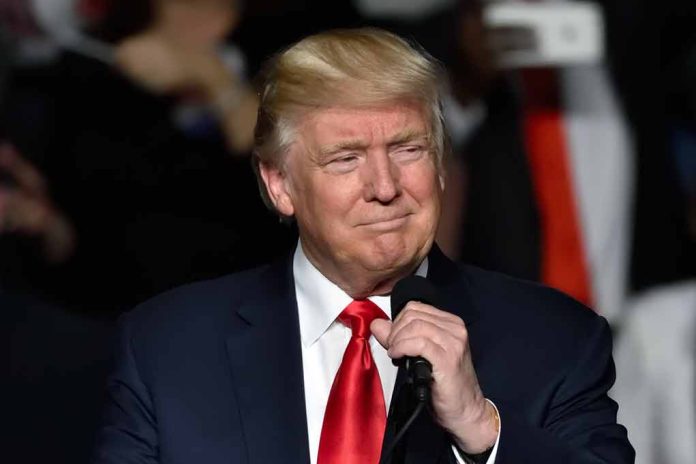
Mitch McConnell, the lone Republican senator to vote against Robert F. Kennedy Jr.’s confirmation as Health and Human Services Secretary, faces criticism from President Donald Trump, exposing deepening rifts within the GOP.
Key Takeaways
- Robert F. Kennedy Jr. was confirmed as HHS Secretary in a narrow 52-48 Senate vote, with Mitch McConnell as the only Republican opposing.
- McConnell, a polio survivor, cited Kennedy’s history of promoting conspiracy theories and undermining public health trust as reasons for his opposition.
- President Trump criticized McConnell’s decision, calling him “bitter” and questioning his mental fitness.
- The confirmation highlights the ongoing tension between Trump’s influence and traditional Republican leadership within the party.
McConnell’s Stand Against Kennedy’s Confirmation
In a surprising move that has sparked controversy within Republican ranks, Senator Mitch McConnell stood as the sole GOP member to vote against Robert F. Kennedy Jr.’s confirmation as Health and Human Services Secretary. The narrow 52-48 Senate vote largely followed party lines, with McConnell’s dissent standing out prominently.
McConnell, who survived polio as a child, emphasized the critical importance of vaccines and expressed deep concerns about Kennedy’s stance on public health issues. The Kentucky senator’s opposition stems from Kennedy’s history of promoting conspiracy theories and what McConnell views as efforts to undermine public trust in established medical practices.
“I’m a survivor of childhood polio. In my lifetime, I’ve watched vaccines save millions of lives from devastating diseases across America and around the world. I will not condone the re-litigation of proven cures, and neither will millions of Americans who credit their survival and quality of life to scientific miracles.” – Senator Mitch McConnell
Trump’s Reaction and Escalating Tensions
President Donald Trump, who had supported Kennedy’s nomination, responded to McConnell’s vote with sharp criticism. Trump questioned McConnell’s mental fitness and claimed ignorance of the senator’s well-known history with polio, further intensifying the rift between the two Republican figures.
This clash highlights the ongoing power struggle within the Republican Party, pitting Trump’s continued influence against the more traditional Republican leadership style represented by McConnell. The disagreement over Kennedy’s appointment to such a crucial position underscores the deeper ideological and strategic divides that the GOP must navigate.
Kennedy’s Controversial Background and Future Challenges
Robert F. Kennedy Jr., an environmental lawyer with no prior health administration experience, now faces the daunting task of overseeing a vast network of health-related agencies. His appointment has raised eyebrows due to his past statements on vaccines and other public health issues.
“Mr. Kennedy failed to prove he is the best possible person to lead America’s largest health agency. As he takes office, I sincerely hope Mr. Kennedy will choose not to sow further doubt and division but to restore trust in our public health institutions.” – Sen. Mitch McConnell
During his confirmation hearings, Kennedy attempted to moderate some of his more controversial views, expressing support for polio and measles vaccines. However, he maintained certain positions that continue to concern public health experts and some lawmakers.
As Kennedy takes office, he faces the challenge of addressing critical issues such as drug pricing and maintaining the 2022 prescription drug law. His leadership will be closely scrutinized, particularly in light of the concerns raised during his confirmation process.
Implications for the Republican Party
The rift between Trump and McConnell over Kennedy’s confirmation is emblematic of broader tensions within the Republican Party. As the GOP looks towards future elections and policy directions, these internal divisions may prove challenging to reconcile.
McConnell’s opposition to Kennedy, along with his previous stances against other Trump nominees, signals a willingness to break from the former president’s influence when he deems it necessary. This dynamic adds another layer of complexity to the Republican Party’s efforts to present a unified front on critical issues.
As the dust settles on Kennedy’s confirmation, the Republican Party faces the task of navigating these internal conflicts while addressing the concerns of their constituents and preparing for upcoming political battles. The coming months will likely reveal whether these tensions can be resolved or if they will continue to shape the party’s direction in significant ways.
Sources:
- Mitch McConnell’s Full Statement on Vote Against Trump Nominee RFK Jr. – Newsweek
- Robert F. Kennedy Jr. narrowly confirmed by Senate as Trump’s health secretary – ABC News
- Why Mitch McConnell voted against RFK Jr. for health secretary
- Trump Slams Sen. McConnell for Voting Against RFK Jr. | Newsmax.com














